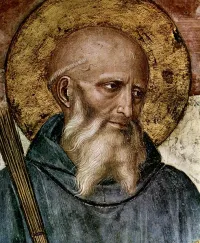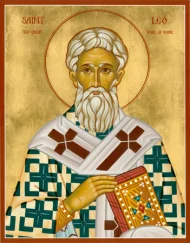 Taught then, dearly-beloved, by these mysteries of Divine grace, let us with reasonable joy celebrate the day of our first-fruits and the commencement of the nations’ calling:
Taught then, dearly-beloved, by these mysteries of Divine grace, let us with reasonable joy celebrate the day of our first-fruits and the commencement of the nations’ calling:
“giving thanks to” the merciful God “who made us worthy,” as the Apostle says, “to be partakers of the lot of the saints in light: who delivered us from the power of darkness and translated us into the kingdom of the Son of His love.”
As Isaiah prophesied, “the people of the nations that sat in darkness, have seen a great light, and they that dwelt in the land of the shadow of death, upon them hath the light shined.”
Of whom he also said to the Lord, “nations which knew not thee, shall call on thee: and peoples which were ignorant of thee, shall run together unto thee.”
This day “Abraham saw and was glad,” when he understood that the sons of his faith would be blessed in his seed that is in Christ, and foresaw that by believing he should be the father of all nations, “giving glory to God and being fully assured that What He had promised, He was able also to perform.”
This day David sang of in the psalms saying: “all nations that thou hast made shall come and worship before Thee, O Lord: and they shall glorify Thy name.”
And again: “The Lord hath made known His salvation: His righteousness hath He openly showed in the sight of the nations.”
This in good truth we know to have taken place ever since the three wise men aroused in their far-off land were led by a star to recognize and worship the King of heaven and earth.
And surely their worship of Him exhorts us to imitation; that, as far as we can, we should serve our gracious God who invites us all to Christ.
For whosoever lives religiously and chastely in the Church and “sets his mind on the things which are above, not on the things that are upon the earth,” is in some measure like the heavenly light.
And, whilst he himself keeps the brightness of a holy life, he points out to many the way to the Lord like a star.
In which regard, dearly-beloved, ye ought all to help one another in turn, that in the kingdom of God, which is reached by right faith and good works, ye may shine as the sons of light.
Leo the Great (c.400-461): Sermon 33, 5.












